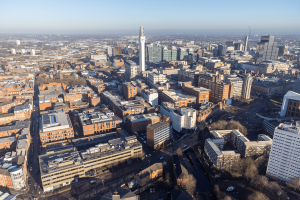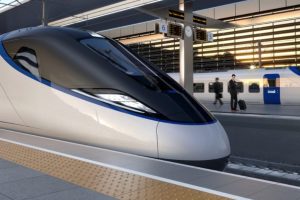Sunak confirms HS2 to be scrapped – hails new Network North
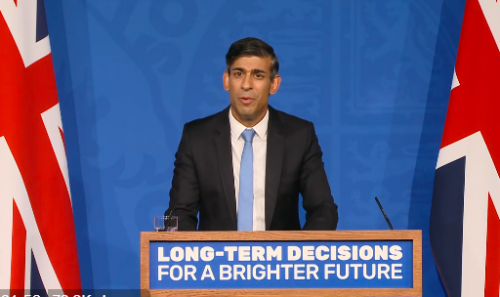
Prime Minister Rishi Sunak has confirmed at his party’s conference in Manchester that HS2 is to be scrapped.
“I am cancelling the rest of the HS2 project,” he said as the centrepiece of an hour long speech where he also pledged that “every single penny” of the budget for the line from Manchester to Birmingham would instead be spent on a new ‘Network North” that would fund “hundreds of transport projects that will make a difference across our nation”.
He mentioned by name a new station at Bradford within 30 minutes of Manchester, a metro tram system for Leeds and an electrification of an east west route from Manchester to Sheffield that would cut journey times to 42 minutes and improvements to the West Cumbria train between Carlisle and Barrow.
He also said he would end “rip off degrees” and a new qualification to post 16 education, offering a requirement to study more subjects, including maths, and a parity of esteem between the technical and academic routes.
A Department for Transport document included more ‘detail’ on the projects and included references to £12bn to “better connect” Manchester and Liverpool, £2bn to repair pot holes in roads, the electrification of the Hope Valley line between Manchester and Sheffield, but was also mocked for referring to the expansion of Metrolink to Manchester Airport, a service that was introduced in November 2014.
Political leaders were particularly irked that they hadn’t been consulted on any aspect of the Network North plans. Greater Manchester Mayor Andy Burnham said: “Surely, this should be done on a cross-party consultative basis?”
At a press conference at the Museum of Science and Industry, the location where George Osborne launched the Northern Powerhouse in 2013, and where Boris Johnson promised Northern Powerhouse Rail, Burnham added: “Does this country have the will within it to actually prioritise the north of England and sort out its transport problems?
“Does this country have it within it to stop treating people here in the north as second-class citizens when it goes to transport and put them at the front of the queue rather than the back of the queue when it comes to investment?”
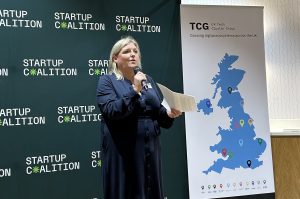
Katie Gallagher
Katie Gallagher, MD of Manchester Digital and chair of the UKTCG, said: “We are saddened but not surprised that the Prime Minister has now confirmed that HS2 will not continue to Manchester as it was originally planned. This was a real opportunity to create modern high speed rail links, free up capacity on our creaking infrastructure and improve regional services across the North.
“The North of England is getting used to empty promises, plans being dropped and changed and more wasted public funds. The promised upgrades to the TransPennine route were delayed and altered, Northern Powerhouse rail was scaled back and the expansion of Piccadilly station in Manchester was cancelled.
“We are waiting for more details on this suddenly-announced Network North and have many questions. For example, is this a newly packaged Northern Powerhouse rail? It’s hard not to believe that Network North isn’t just another empty promise.”

Clare Hayward
Clare Hayward MBE, DL Interim Chair of the NP11 and Chair of Cheshire and Warrington Local Enterprise Partnership, said the cancellation will affect the confidence of investors, domestically and internationally, undermined the hopes and aspirations of people and businesses.
“Northern Powerhouse Rail and HS2 are designed to work in tandem, complementing one another and together they would deliver an unparalleled economic boost to the country.
“We will be looking very carefully at the details coming out of the Prime Minister’s announcement and are keen to meet and collaborate with Ministers to ensure that the UK can benefit from the untapped potential of the North.”
Salford City Mayor Paul Dennett cast doubt over the trade offs suggested and pointed to the government’s track record on a piecemeal approach to rail investment in Greater Manchester:
“These trade-offs are also being mooted at a time when here in Salford and Greater Manchester, all our railway stations are far from being accessible; the additional platforms at Salford Central to enable larger trains to stop have been paused and the frequency of train services calling at our stations are hampered by network constraints such as the Castlefield corridor and freight and passenger rail using the same network. Despite the feat of engineering that is the Ordsall Chord, this investment continues to remain significantly under-utilised.
“Today’s news will only further impact the myriad of network, capacity and time-tabling issues we’re already grappling with in Salford but it also serves to further highlight the rhetoric and reality from the current Government when it comes to levelling-up and transport investment in Greater Manchester and the North.”
Greater Manchester Chamber of Commerce’s Director of Policy, Chris Fletcher, said: “This still has the feeling of a political concept rather than a practical solution.
“Put bluntly we are fed up of broken promises, delays, cuts and hopes about finally getting what we need being dashed for political expediency. We will be watching closely and waiting on further details of what will be delivered and, more importantly, when.”
Trade union reaction was swift as Laurence Turner, GMB Head of Research and Policy, said: “Rishi Sunak’s decision to inflict the biggest rail cut since the Beeching axe will send a shockwave through the construction industry and railway supply chain, costing hundreds of jobs.
“The UK’s political instability was already holding the economy back – it will now be even harder to fund and deliver the new infrastructure that the country desperately needs.
“We can’t rebalance the economy or fix the railway capacity crisis without HS2. It’s essential that the planned route is now protected so that a future government can reverse this disastrous decision.”
Norman Baker, from the Campaign for Better Transport, attacked “this ragtag and bobtail selection of bits and pieces” and said Sunak’s announcement simply diverts money from a sustainable transport future into unsustainable and unchecked traffic growth. “We need more detail about what the transport projects that will replace the Northern leg of HS2 are and when they will actually be delivered. We also need to make sure that the PM is not double counting here as some of the schemes he mentioned have already been promised and are not new. What we do know is that ditching the Northern leg is not just a serious blow to the North of England and its people, but to the country as a whole.”
Emma Antrobus, director at the Institution of Civil Engineers North West said Sunak’s decision underlines “a lack of ability to grapple with and deliver major transformational infrastructure projects” and said “we are stuck with a piecemeal approach ignoring the bigger picture, and never realising the full societal and economic benefits that transformational infrastructure projects can deliver.”

Paul Cherpeau
Paul Cherpeau, chief executive of Liverpool Chamber, slammed a “shambolic approach to levelling-up” and said business owners want to know that the government has a coherent plan to improve vital infrastructure: “they will want to hear a solid commitment from the government that it will actually deliver on these latest investment promises after so many false dawns.”
He added: “Business owners want to know that the Government has a coherent plan to improve vital infrastructure that will directly support their businesses through the smoother movement of freight and people. Moreover, they will want to hear a solid commitment from the Government that it will actually deliver on these latest investment promises after so many false dawns.”
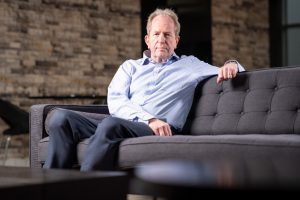
Martin McTague
Martin McTague, national chair of Blackpool-based Federation of Small Business, widely regarded as the voice of ‘white van man’, said: “Major multi-year, multi-government projects such as the Net Zero transition or HS2 require a long term, cross-party, multi-government approach, much like when the UK hosted the Olympic Games in 2012. This is the only way to cope with the UK’s four- or five-year electoral cycle, or at times when the Government changes more quickly.
“Improving east-west links across the North of England and the Midlands is absolutely vital, but so is connecting them into the national network, as would have happened by connecting Northern Powerhouse rail to HS2.
“The new or improved projects need to be assessed for benefits on capacity and connectivity for both passengers and freight, to set them against what has been lost from HS2 today. Ultimately, the responsibility is now on the Government to prove that these new decisions will deliver value for money for taxpayers and make life easier for small business.”
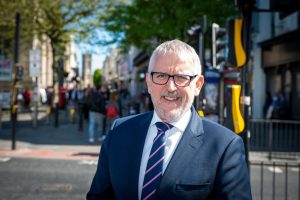
Bill Addy, CEO, Liverpool BID
Bill Addy, CEO of Liverpool BID Company, representing more than 800 businesses within Liverpool city centre, said: “If there’s one thing we know in business it’s that confidence comes from delivery, a proven track record in service and getting the job done. A lot of promises have been made to Liverpool when it comes to rail, but we are yet to see any real delivery.
“After a year of chaos on the rail, the impact is felt on our high streets and our boardrooms, it has hit confidence and the city economy from tourism to manufacturing.
“We need viable and ambitious plans to support businesses across the North to help them continue to create jobs, to pay taxes and support public services. We have been offered no specific plans, no specific timeline and no promise of impact. We urge whomever has control of the budget over the next decade to put credible plans in place that are delivered.”
Tim Heatley, co-founder of property developer Capital&Centric, said the commitment to local and regional public transport was “some consolation” and called for plans to be fast-tracked, but said cancelling HS2 was a missed opportunity.
“In many ways, the Government is investing in communities and we’re working with Michael Gove’s department on regeneration projects that will make a real change in locations that need investment, like Stoke-on-Trent and Farnworth, which was recently announced as a recipient of new funding.”
John Nash, director at property agents Canning O’Neill expressed doubts over the commitment to Network North and described the about turn as “incompetent at best.”

Michelle Craven-Faulkner, Shoosmiths
Michelle Craven-Faulkner, partner and rail lead at law firm Shoosmiths, blasted a lack of leadership on HS2 and rail policy generally, and said: “HS2 was never just about getting to London faster. Its aim was increasing connectivity, capacity and creating a high-speed rail spine in the UK – providing the infrastructure for routes to spur off and deliver the east-to-west connectivity raised in today’s announcement.
“Those working in the sector and the supply chain have been provided with little clarity over the last few years – navigating almost constant changes in policy, beginning with the Integrated Rail Plan for the North and Midlands, the gradual chipping away of HS2 and the proposed shift to Great British Railways – the future of which is hanging in the balance.
“This lack of leadership and consistency has stymied investment into rail and efforts to upgrade the existing network, as demonstrated by procurement delays for Network Rail’s Control Period 7, a £44bn five-year plan to improve the railway in England and Wales.
“What is needed now is some transparency as to when and how the proposed projects will be delivered and what is the pipeline. Without that, the UK rail industry is still in the dark.”
Andrew Dickman, Managing Director at Tritax Symmetry, commented: “The Prime Minister’s decision to abandon plans for HS2 to run from Birmingham to Manchester will have a detrimental impact on the country’s economy for decades to come. Excellent infrastructure and connectivity are an essential component of a thriving economy. HS2 would have provided that and would have also demonstrated that the Government was truly committed to levelling up. As it stands, we are now left with a national rail service, which is quite simply not fit for purpose.”


